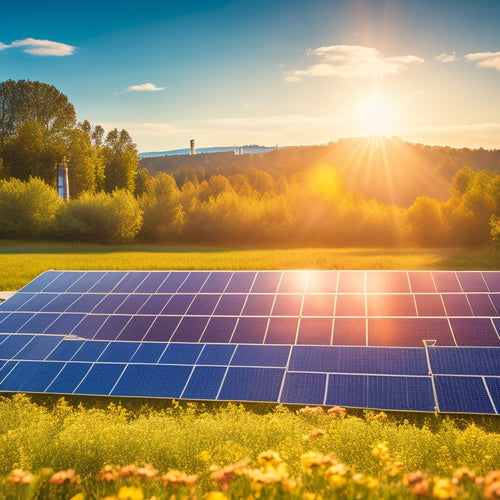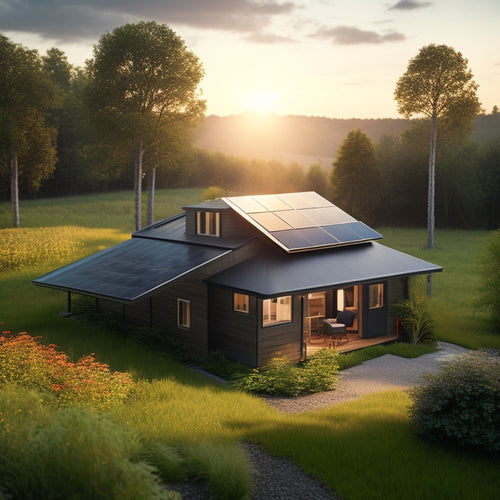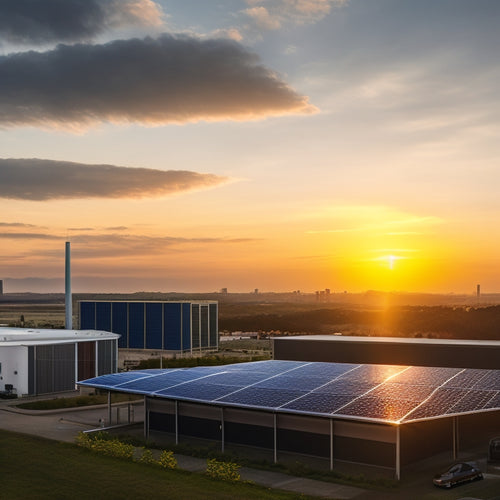
Residential Roof Solar Panels
Share
You're considering installing residential roof solar panels, a move that can greatly enhance your property value by up to 17% while providing a sustainable source of energy and reducing your reliance on the grid. With high-efficiency panels operating at 22-24% efficiency, you can generate more electricity from sunlight, leading to long-term savings of $500 to $1,000 annually on your energy bills. By evaluating your roof's size and orientation, you can optimize panel placement and reap the benefits of energy independence. Now, take the next step in utilizing the power of solar energy and investigate the specifics that can make it a smart investment for your home.
The Essentials
- Residential roof solar panels can increase property value by up to 17% and attract eco-conscious buyers.
- Solar panels capture free energy from the sun, reducing reliance on the grid and generating long-term savings on electricity bills.
- High-efficiency solar panels operate at 22-24% efficiency rates, converting 20-22% of sunlight into usable energy.
- Strategic positioning and installation of solar panels on residential roofs can minimize shading and maximize energy output.
- Investing in solar panels contributes to a lower carbon footprint, promotes sustainability, and can qualify for government incentives.
Boosts Property Value Instantly
As you consider installing residential roof solar panels, you'll find that they can greatly enhance your property's value instantly.
By utilizing free, renewable energy from the sun solar panel installation for homes, homeowners can reduce their reliance on the grid and lower their monthly electricity bills.
This increase in value can be attributed to the appeal of renewable energy and the long-term savings that come with solar panels.
Increased Home Worth
Installing residential roof solar panels can greatly enhance your property's value, a benefit that's reflected in the sale price should you decide to put your home on the market. This increase in value is attributed to several factors, including tax incentives, environmental benefits, and low maintenance considerations.
| Benefits | Description | Impact on Home Worth |
|---|---|---|
| Tax Incentives | Receive credits for installing solar panels | Increased value due to reduced tax liability |
| Environmental Benefits | Reduce carbon footprint and contribute to a sustainable future | Enhanced appeal to environmentally conscious buyers |
| Low Maintenance | Solar panels require minimal upkeep and are durable | Increased value due to reduced maintenance costs |
| Financing Options | Various financing options available, including loans and leases | Increased value due to accessibility |
| Aesthetic Impact | Sleek, modern design enhances your home's curb appeal | Increased value due to improved visual appeal |
Higher Selling Prices
Because you've invested in residential roof solar panels, you can expect a significant increase in your property's value, resulting in higher selling prices when you decide to put your home on the market. This enhancement in value is driven by market demand for eco-friendly homes and buyer preferences for properties with reduced environmental impact.
By embracing a cleaner, more sustainable future with renewable energy solutions, homeowners can reap the benefits of reduced electricity bills and a lower carbon footprint. According to recent studies, homes with solar panels sell for up to 17% more than similar homes without them.
Additionally, solar incentives and financing options can offset the initial installation costs, making your investment even more attractive to potential buyers. The aesthetic appeal of solar panels, combined with the long-term savings they provide, can give your property a competitive edge in the market.
Moreover, local regulations and maintenance considerations are often more lenient for solar-powered homes, adding to their appeal. By installing residential roof solar panels, you're not only increasing your property's value but also contributing to a more sustainable future.
Increases Energy Independence Fast
By installing residential roof solar panels, you'll capture free energy sources from the sun, reducing your reliance on the grid.
With the ability to generate renewable energy, you'll decrease your carbon footprint and contribute to a more eco-friendly home.
This means you'll generate your own electricity, decreasing your dependence on external power sources.
As a result, you'll increase your energy independence, enjoying greater control over your energy needs and costs.
Harness Free Energy Sources
Tap into Mother Nature's generosity and let the sun's rays power your home with residential roof solar panels.
You'll be utilizing free energy sources, reducing your reliance on fossil fuels, and contributing to a sustainable future. By switching to solar energy, you'll tap into a renewable resource that's abundant and available everywhere. The environmental benefits are significant, as you'll reduce your carbon footprint and help combat climate change.
The installation process is straightforward, and government incentives can help offset the initial cost. Plus, with energy storage solutions, you can store excess energy generated during the day for use at night or during power outages.
Maintenance requirements are minimal, and the financial returns are substantial. With technology advancements driving down costs, solar energy is becoming increasingly competitive with traditional energy sources.
Reduce Reliance on Grid
As you employ the power of solar energy, you'll notice a significant decrease in your reliance on the grid. This reduction in reliance brings numerous benefits, including increased energy independence, grid stability benefits, and a reduced environmental impact.
| Benefits of Reducing Reliance on Grid | Description | Impact |
|---|---|---|
| Solar Energy Savings | Reduced energy bills | $500 - $1,000 per year |
| Grid Stability Benefits | Reduced strain on the grid | Increased grid reliability |
| Environmental Impact | Reduced carbon footprint | 3-4 tons of CO2 per year |
| Increased Energy Independence | Reduced reliance on external energy sources | Freedom from price volatility |
| Long-term Investment | Increased property value | 3-5% increase in property value |
High-Efficiency Panel Options
When selecting high-efficiency solar panels for your residential roof, you're looking for maximum power output and a high energy conversion rate.
These two factors are vital in determining how much electricity your system will generate and how efficiently it will convert sunlight into usable energy.
High-efficiency solar panels, such as top ranked high efficiency solar panels, can greatly reduce your carbon footprint and energy bills.
Maximum Power Output
Most residential solar panels typically operate at an efficiency rate of 15-20%. However, if you're looking to maximize your power output, you'll want to take into account high-efficiency solar panel types.
These advanced panels can reach efficiency rates of up to 22-24%, resulting in more energy production per hour of sunlight.
When evaluating high-efficiency panels, you'll notice they often come with a higher price tag. But, if you're looking to optimize your energy storage, the extra investment may be worth it.
High-efficiency panels can help you store more energy in your battery backup system, providing you with a reliable source of power during outages or at night.
To get the most out of your high-efficiency panels, think about pairing them with a sophisticated energy storage system.
This will enable you to store excess energy generated during the day for use during periods of low sunlight or at night.
Energy Conversion Rate
Employing sunlight efficiently is vital to maximize your residential roof's solar panel performance. This is where the energy conversion rate comes into play. The energy conversion rate, also known as the efficiency rate, refers to the percentage of sunlight that's converted into usable electricity.
High-efficiency solar panels boast higher energy conversion rates, typically ranging from 20% to 22%. This means that for every unit of sunlight that hits the panel, it can produce 20-22% more electricity.
When selecting solar panels for your residential roof, it's important to take into account high-efficiency panel options. These panels employ advanced solar technology to optimize energy efficiency.
By investing in high-efficiency panels, you can generate more power per hour of sunlight, reducing your reliance on the grid and increasing your energy independence.
With the latest advancements in solar technology, you can now achieve higher energy conversion rates without breaking the bank. By choosing the right high-efficiency panels, you'll be making the most of sunlight to power your home, giving you the freedom to live life on your own terms.
Consider Roof Size Constraints
When evaluating your roof's potential for solar panels, you'll need to contemplate the available roof space.
You'll want to determine how much space is available for panel installation, considering obstacles like vents, skylights, and chimneys.
Additionally, it's crucial to guarantee that your solar panel mounts are sturdy and adjustable, similar to roof mount systems, to securely hold your panels in place.
Roof Space Availability
How much of your roof is actually available for solar panels? You'll need to assess your roof's space constraints to determine the ideal placement of your solar panels.
Start by evaluating your roof's orientation. A south-facing roof receives the most sunlight, making it perfect for solar panels. However, if your roof faces east or west, you can still generate a significant amount of energy.
Next, conduct a shading analysis to identify areas of your roof that receive partial or full shade. This can be due to surrounding trees, buildings, or even roof features like skylights or vents. You'll want to avoid installing panels in these areas, as they'll reduce energy production.
Measure your roof's dimensions and note any obstructions, such as chimneys or vents, that may limit panel placement.
Optimizing Panel Placement
With your roof's space constraints in mind, optimizing panel placement is essential to maximize energy production. You'll want to identify the most efficient layout to generate the most electricity possible.
A thorough shading analysis will help you pinpoint areas where trees, chimneys, or other obstructions might cast shadows, reducing energy output. By factoring in these potential obstacles, you can strategically position your panels to minimize shading and maximize exposure to direct sunlight.
When deciding on the installation angle, consider your roof's pitch and local building codes. A steeper angle can help prevent debris accumulation, but may compromise energy production.
A shallower angle can optimize energy output, but may require more frequent cleaning. You'll need to strike a balance between these competing factors to achieve the best results.
Silicon Cells Outperform Thin-Film
You'll find that silicon cells outperform thin-film solar panels regarding efficiency rates.
With average efficiency rates ranging from 15% to 20%, silicon cells can convert more sunlight into usable energy.
In contrast, thin-film panels typically have efficiency rates between 7% and 14%, making silicon cells the better choice for residential roof installations.
Higher Efficiency Rates
What sets silicon cells apart from thin-film technology is their significantly higher power output per unit area. This higher efficiency rate translates to more energy harvested from the same roof space, giving you greater freedom to power your home.
With silicon cells, you can generate more electricity per hour of sunlight, making them a more effective choice for residential roof solar panels.
As solar technology advancements continue to improve, silicon cells are becoming even more efficient. This means you can store more excess energy in your energy storage solutions, such as batteries, for later use.
With higher efficiency rates, you'll be less reliant on the grid, giving you greater energy independence. When considering residential roof solar panels, it's crucial to prioritize efficiency to maximize your energy output.
Frequently Asked Questions
Can Residential Solar Panels Be Installed on Metal Roofs?
You'll be pleased to know that, yes, solar panels can be installed on metal roofs, but you'll need to verify the installation meets specific requirements, including metal roof compatibility, to confirm a secure and efficient energy-harvesting system.
How Do Solar Panels Affect Roof Warranties?
When you install solar panels, you'll need to take into account roof warranty implications; the installation process can void or alter your existing warranty, so it's essential to review and understand the terms to guarantee you're not compromising your roof's protection.
Are Solar Panels Noisy During Operation?
As you ponder the hum of technology, you'll find solar panels operate silently, with no moving parts, and are designed with sound insulation to minimize any potential noise, ensuring a peaceful coexistence with the environment.
Do Solar Panels Work Well in Shaded Areas?
You'll find that solar panels' efficiency takes a hit in shaded areas, as even partial shading can considerably reduce energy output, so it's crucial to assess the shading impact on your solar panel system's performance.
Can I Install Solar Panels Myself to Save Money?
You'll need extensive electrical and roofing knowledge to guarantee a safe, efficient DIY installation, but if you're willing to take on the challenge, you can potentially achieve significant cost savings by avoiding labor costs.
Final Thoughts
As you weigh the benefits of residential roof solar panels, consider this: they're the key to revealing a brighter financial future, where energy independence and increased property value are the icing on the cake. Like a puzzle piece, high-efficiency panels fit seamlessly into your roof's environment, outperforming thin-film alternatives. With silicon cells leading the charge, you'll be capturing the sun's energy in no time, and your wallet (and the planet) will thank you.
Related Posts
-

Advantages of Solar Generating Systems Over Traditional Energy
Solar generating systems provide several key advantages over traditional energy sources. You'll experience lower long...
-

Diy Off Grid Solar
By embracing DIY off-grid solar, you can break free from grid dependence, slashing your energy bills by up to 90% and...
-

Advantages of Commercial Solar Battery On-Site Storage
By investing in a commercial solar battery on-site storage system, you can greatly reduce your energy grid dependence...


